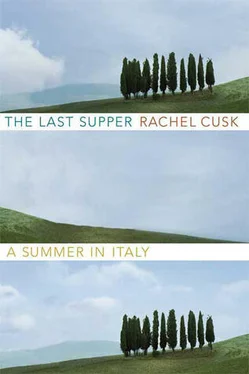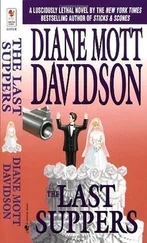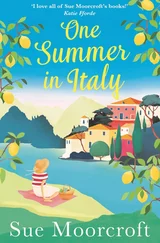The children are in the garden with Nestor the dog. The blue pall of evening deepens around them in the trees. Finally, Bertrand suggests that we go in: it is getting dark. He is expecting more people but they have not yet arrived. It is irritating, for dinner must be at eight. He has informed these people of this fact: it is a shame they cannot be punctual. But some people are like that. There is no accounting for them. Distressed as he is, I venture to ask what he wishes me to do with the children. His large, orblike eyes grow larger still. There can be no question: we will all eat together. The food is quite simple. It is merely a question of waiting for the reprobates to arrive. Shortly afterward they do. They are a gray, narrow, pinched-looking couple: they have been walking all day in the Ardèche and misjudged the time it would take them to get back. It is a little inconvenient, ce loisir , is it not? And the road is so potholed, so slow! The woman’s pale, angular cheeks wear a hectic pink flush beneath her spectacles. The man is bearded and severe. Bertrand brings more glasses. We arrange ourselves in the cultured sitting room, with its canvases and totemic masks and abstract sculptural forms. Beyond the large windows the vast, watery, blue-tinged darkness deepens. The other couple reveal that they have been staying at Bertrand’s for the whole week. Tomorrow they return to Lyons. It is their hobby, to take walking holidays. They take several a year. They have walked in every significant part of France, though not, until now, the Ardèche. They have not been disappointed by the Ardèche, though it does not attain the heights of their favorite, the Cévennes. The Cévennes are nearby, as are the Rhône Alps, another favorite of theirs. But this area certainly has its merits.
Bertrand announces that dinner is ready. We pass through the house, through the circular hall, through a passageway that elides the kitchen and twists and turns, and into a long vaulted stone room with great glass doors all along one side. This, I now see, forms the end of the courtyard that is at right angles to the house. The table is shrouded in white damask, laden with candelabra, silverware, and glass. We are served hot asparagus and tissue-thin leaves of smoked ham. We are served pale yellow wine from a crystal decanter, and warm rolls with cold butter. The bearded man and his wife seem to take all this as a matter of course, but we feel an amazement that borders on consternation. What does it signify, all this refinement, this correct and devotional passion for sensual things? At home, certainly, I often felt that our life lacked beauty: I looked for it in music, in poetry and painting, sometimes in the world itself, when a particular evening sky or fall of light, a glimpse of city trees in leaf or of the forms of my children, seemed to become more than itself, to become representational. I would put peonies in a vase, wash the floors, tidy up; but I never found much art in daily things. There was always too much reality, churning just ahead, mixing everything together into a gray, agitated mass. It was only in writing that I could separate them again, and distinguish the bad from the good. But this man Bertrand lives behind a high wall, far from other people. He has asked that only beautiful things come near him. Is this the right way to be? Is it permitted, to turn your back on churning reality?
We ask the bearded man what he does for a living, and he replies that he is retired. We are surprised: he can barely be more than fifty. What was his trade? He says he was an employee of the French national railway. One retires early there, at fifty, and the pension, a final-salary scheme, is very generous. The bearded man is rather defensive as he relays these facts. Bertrand explains that there are many French people who find the arrangement somewhat unfair, outrageous even, and the bearded man sits erect while the explanation is given. Then he proceeds to cut up his food and place the pieces methodically in his mouth. Bertrand watches him, a glint in his eye. This couple have irritated him, gray and complacent and ungiving as they are. They swallow his food without comment; they weigh up his domain coldly, rationally, indifferent to all but their own preferences. Why does he expose himself to the world in this way? I don’t believe he does it entirely for money: there is no need to treat us as lavishly as he does. He does it, perhaps, for the same reason that artists show their work, for the same reason I choose to publish the books I write rather than lock them in a drawer. Indeed, this couple have their exact equivalent in the field of literary criticism. It doesn’t trouble them at all that they could never create something beautiful, as Bertrand has. Nonetheless, their presence here indicates that after all Bertrand does need the world, so that it may look on what he has done. In the end he needs reality, to measure his creation against.
But Bertrand wants to talk about les Anglais . He has the impression that the English male, in his most fully realized form — the English politician, for example — is more various, more cultivated, more branché somehow than his French equivalent. He has a broader knowledge of life, a bigger range. He heard such a man talking on the radio the other day, a politician, what was his name? Douglas Hurd. This Douglas Hurd was a man of culture and sensitivity and yet also a man of power. In France this is unthinkable. The man of culture is a man of culture, the politician a politician. Bertrand has by now served us with a melting feuilleté de poissons , a salad of crisp herbs and leaves and lemon, and a new, paler wine from another crystal decanter. I say that probably the English male is troubled by precisely the same feelings about the French. I am not entirely certain that this is true. Bertrand nods his large head thoughtfully and disappears into the kitchen. The two children have eaten very little of their food. They were struck dumb by the arrival of the asparagus, and have remained that way for the rest of the evening. They do not dislike asparagus: on the contrary, at home they eat it often. But they appear surprised to have met it here, amid the spectacle of Bertrand’s dining room. The wife of the bearded man is looking at them with the diffident French expression that I always mistake for disapproval — though this time it turns out that I am right. I ask her whether a French child would have eaten everything on its plate. Of course, she says. She does not care for my veiled English compliment: she merely shrugs at my obtuseness. A French child eats what it is given. It has to be done from the beginning, she adds, lest I am thinking of making up for lost time by forcing the food down their throats then and there.
There is a beef stew and more wine, and the conversation goes faster and faster until I cannot keep up. Bertrand sends the dish around for second helpings, and when it is her turn Madame takes the serving spoon and dabs it on her plate, an act that seems hieratic in its significance, like the motions of a priest at the altar. It spots her plate with a portion the size of a fingernail, which she does not touch. Later Bertrand brings chocolate mousse in chilled glasses, decorated with beautiful candied orange peels that wear little half-casings of chocolate. He admits that he made them himself. Afterward I take the children upstairs along the creaking passage. I lie on their bed and read to them, among the dark forms of unfamiliar furniture, while the owls hoot outside. I think of how fortunate it is that there is a word — holiday — which not only explains the experience of going to bed in strange rooms but decrees it to be pleasurable. When I return downstairs it is to find the cognac out and the laughter loud and even Madame grown a little garrulous in her cardigan and blouse and gathered skirt. There is coffee; I ask if I may smoke. Of course, says Bertrand solemnly, I myself was once a great smoker. J’étais un grand fumeur. It sounds like the beginning of a story, but of course it is only the end of one. At some point Bertrand smoked his last cigarette: it is very clear to me, this moment of renunciation. It decorates him like a priestly robe, or a medal. Bertrand has thrown off the temptation to live life without recognizing the finality of all things.
Читать дальше












